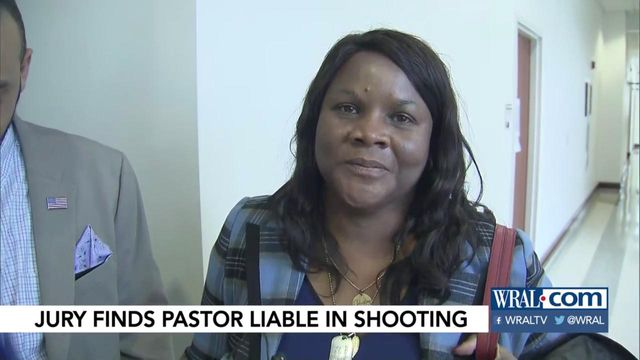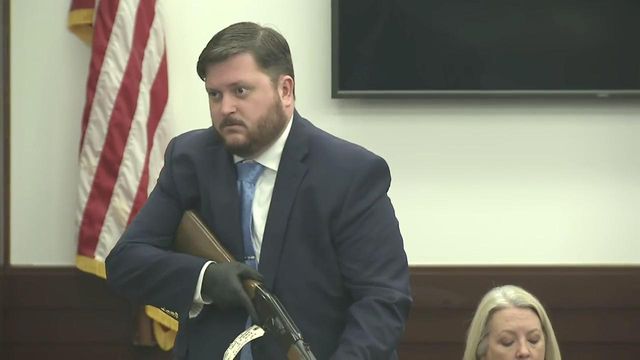In civil trial, jury finds Angier pastor did not kill son-in-law in self defense
A Harnett County jury Wednesday found that an Angier pastor is responsible for the wrongful death of his son-in-law, who he shot and killed in 2013.
Posted — UpdatedThe Rev. Pat Chisenhall has said 23-year-old Christian Griggs was threatening him and breaking into his home when Chisenhall shot him six times with a .22-caliber semiautomatic rifle. Griggs was struck once in the stomach, once in the shoulder and four times in the back. The pastor was never criminally charged in the shooting, and said he was fearful for his and his daughter's lives.
The Griggs' family filed a wrongful death lawsuit against Chisenhall in 2015, disputing his version of events. They say their son was at the Chisenhall homestead to pick up his then 4-year-old daughter for scheduled visitation.
It took the 12-member jury about an hour and a half to return a unanimous verdict that Chisenhall is civilly liable for the wrongful death of Christian Griggs and was not protected by arguments of self defense, defense of his daughter's life or defense of his home. They awarded $250,000 in damage to Griggs' estate, money that will go to his 10-year-daughter Jaden.
Dolly Griggs, the plaintiff in the suit and the mother of Christian Griggs, said after the verdict that the citizens of Harnett County "saw the truth in the courtroom today." She also called on elected officials to act.
"The truth is out there, and now I challenge DA Stewart, Sheriff Coats, Governor Cooper, Josh Stein to look into this case, because Harnett County needs help," Dolly Griggs said. "Please help us here."
Speaking for Chisenhall, who left the courtroom shortly after the verdict, attorney Robert Levin said his client was disappointed in the decision, but did not plan to appeal.
Neither Harnett County Sheriff Wayne Coats, whose office investigated the case, nor District Attorney Vernon Stewart, who ultimately decided not to press criminal charges, were available for comment Wednesday afternoon following the verdict.
At the center of the civil case was North Carolina's Castle Doctrine, which protects those who injure or kill in defense of their lives or their property while in their homes, workplaces or vehicles.
Testimony recounted Griggs' final moments
The jury heard five full days of testimony in the case, which saw evidence from the medical examiner who performed Griggs' autopsy, detectives who investigated the case, Griggs' father and Chisenhall himself, who said on the stand he had trouble remembering many of the details of the shooting.
The pastor of the Abundant Life Worship Center in Angier said on the stand that Griggs had arrived at his home in Angier on the morning of Oct. 12, 2013 hostile and demanding to see his estranged wife, Katie, and their then 4-year-old daughter Jaden.
Chisenhall said Griggs became enraged when he was informed his wife had taken out a restraining order against him for an incident the night before. There was no such restraining order, but Katie Griggs had taken out misdemeanor warrants against her husband the night before for breaking and entering, property damage and domestic criminal trespass.
Chisenhall and his daughter both called 911, the jury heard, and retreated into Chisenhall's home on NC Highway 210 in Angier. He said he struggled to get the door closed with his son-in-law on the other side, and moments later heard the glass in the front window shatter. But following a diagnosis of post-traumatic stress disorder, Chisenhall said he couldn't remember anything after that glass broke.
That left him unable to remember interviews he gave to Harnett County sheriff's deputies in the days after the shooting, when he said he shot Griggs from behind a sofa 10 to 12 feet away from a partially busted in window as his son-in-law was attempting to crawl in. Chisenhall told investigators at the time that Griggs at threatened to kill him and his daughter, and that they were both terrified of what would happen if he got into the house.
On the stand, Associate Chief Medical Examiner Lauren Scott said her autopsy on Griggs in 2013 showed that he had been shot six times. Four of those shots were in the back, with upward trajectories that suggested Griggs was either bent parallel to the ground or lying down when he was hit by the Winchester rifle.
Scott also testified that two of the four shots in the back would have been fatal wounds for Griggs, regardless of any medical intervention.
Chisenhall described his son-in-law as a great, but troubled man who he loved and was close with throughout a tumultuous, on- and off-again relationship with his daughter. He presided over their marriage when they were just out of high school at 18 years old, new parents of a two-month old daughter. Griggs wrote the pastor letters while he was deployed as an enlisted soldier, and considered him at one point to be his spiritual adviser.
Chisenhall even baptized Griggs in his backyard swimming pool three weeks before the shooting.
But he said Griggs had a darker side that emerged on Oct. 12, 2013, when he said he saw his son-in-law launched into a "monstrous rage" that terrified him and his daughter. His lawyer argued he had no choice but to take Griggs' life in self-defense.
Attorneys for Griggs' family countered that the shots in Griggs' back demonstrated that he was no longer a threat, and that arguments of self-defense and defense of habitation did not apply.
Related Topics
• Credits
Copyright 2024 by Capitol Broadcasting Company. All rights reserved. This material may not be published, broadcast, rewritten or redistributed.






